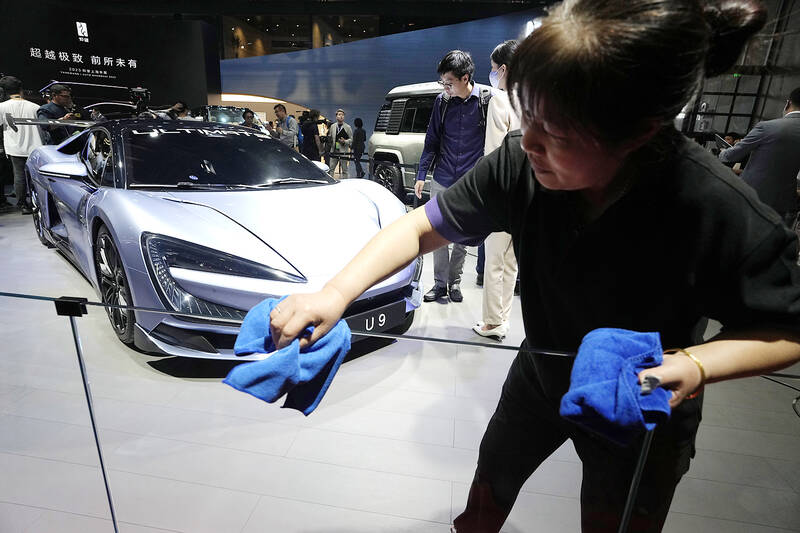BYD Co (比亞迪) reported another stellar quarter of earnings on the back of booming electric vehicle (EV) sales that propelled it past Volkswagen AG to become China’s top-selling vehicle brand.
Net income in the first three months of this year surged 411 percent from a year earlier to 4.13 billion yuan (US$596.3 million), the Shenzhen, China-based automaker said in a statement on Thursday.
Operating revenue rose 80 percent to 120.2 billion yuan, while gross margin was 17.9 percent, up about 5.5 percentage points.

Photo: AP
BYD’s margins should continue to grow this year, helped by its Denza and U8 models, Citigroup Inc analysts Jeff Chung and Beatrice Lam (林禧妤) said, while Morgan Stanley analysts Tim Hsiao (蕭柏庭) and Cindy Huang said the results showed resilience amid industry headwinds.
The company’s vertically integrated business model helped shore up profitability, they said.
Bloomberg Intelligence analysts said BYD’s robust quarterly results confirmed the view that cheaper batteries and greater benefits of scale are contributing to margin stability, despite tougher competition after waning subsidies and rivals’ price cuts.
New model launches have kept demand robust and inventory tight, they said.
Sales of BYD’s passenger EVs almost doubled to 550,000 globally in the first quarter.
While the company has been intensifying its push overseas, prioritizing Europe, Latin America and markets around Asia, about 440,000 of its sales in the period were in China, amounting to about 40% of all EV sales in the world’s biggest auto market.
Volkswagen was the best-selling brand among automakers in China since at least 2008, when data from the China Automotive Technology and Research Center became available.
Volkswagen sold 427,247 vehicles under its brand in the country in the first quarter, with EVs accounting for only 6 percent.
BYD, whose biggest investor is Warren Buffett’s Berkshire Hathaway Inc, aims to deliver 3 million to 3.7 million EVs this year, Bloomberg Intelligence estimates.
The company sold 1.86 million EVs last year, more than the previous four years combined.
Growth is likely to stem from a range of new models that BYD unveiled at this month’s Auto Shanghai, covering both ends of the price spectrum — from the 73,800 yuan Seagull hatchback to the 1.1 million yuan Yangwang U8 luxury sports utility vehicle.
Despite rising raw material costs and spending on new factories, and research and development, as well as being the seasonally slowest quarter, BYD posted its third-highest net income on record, said Jack Shea, founder and chief financial officer of Shenzhen-based fund Snow Bull Capital, which has a stake in the EV maker.
“We expect to see its margin grow as these new factories ramp up across China, its ASP [average selling price] increase with new models coming to market and raw material prices stabilizing later this year,” Shea said.

Vincent Wei led fellow Singaporean farmers around an empty Malaysian plot, laying out plans for a greenhouse and rows of leafy vegetables. What he pitched was not just space for crops, but a lifeline for growers struggling to make ends meet in a city-state with high prices and little vacant land. The future agriculture hub is part of a joint special economic zone launched last year by the two neighbors, expected to cost US$123 million and produce 10,000 tonnes of fresh produce annually. It is attracting Singaporean farmers with promises of cheaper land, labor and energy just over the border.

US actor Matthew McConaughey has filed recordings of his image and voice with US patent authorities to protect them from unauthorized usage by artificial intelligence (AI) platforms, a representative said earlier this week. Several video clips and audio recordings were registered by the commercial arm of the Just Keep Livin’ Foundation, a non-profit created by the Oscar-winning actor and his wife, Camila, according to the US Patent and Trademark Office database. Many artists are increasingly concerned about the uncontrolled use of their image via generative AI since the rollout of ChatGPT and other AI-powered tools. Several US states have adopted

A proposed billionaires’ tax in California has ignited a political uproar in Silicon Valley, with tech titans threatening to leave the state while California Governor Gavin Newsom of the Democratic Party maneuvers to defeat a levy that he fears would lead to an exodus of wealth. A technology mecca, California has more billionaires than any other US state — a few hundred, by some estimates. About half its personal income tax revenue, a financial backbone in the nearly US$350 billion budget, comes from the top 1 percent of earners. A large healthcare union is attempting to place a proposal before

KEEPING UP: The acquisition of a cleanroom in Taiwan would enable Micron to increase production in a market where demand continues to outpace supply, a Micron official said Micron Technology Inc has signed a letter of intent to buy a fabrication site in Taiwan from Powerchip Semiconductor Manufacturing Corp (力積電) for US$1.8 billion to expand its production of memory chips. Micron would take control of the P5 site in Miaoli County’s Tongluo Township (銅鑼) and plans to ramp up DRAM production in phases after the transaction closes in the second quarter, the company said in a statement on Saturday. The acquisition includes an existing 12 inch fab cleanroom of 27,871m2 and would further position Micron to address growing global demand for memory solutions, the company said. Micron expects the transaction to